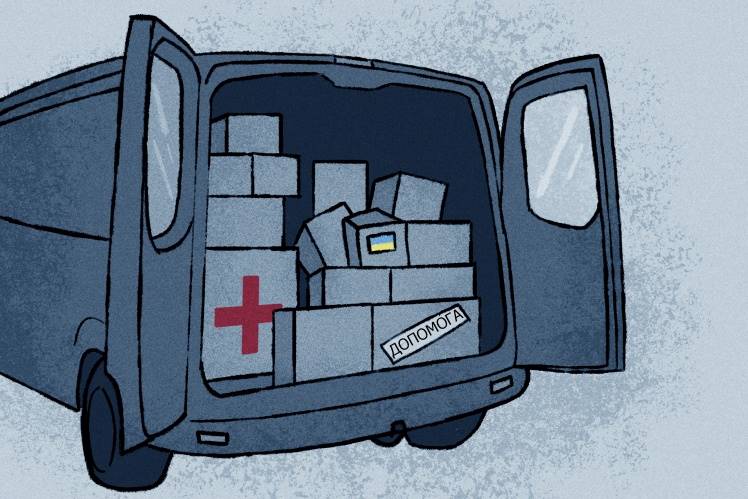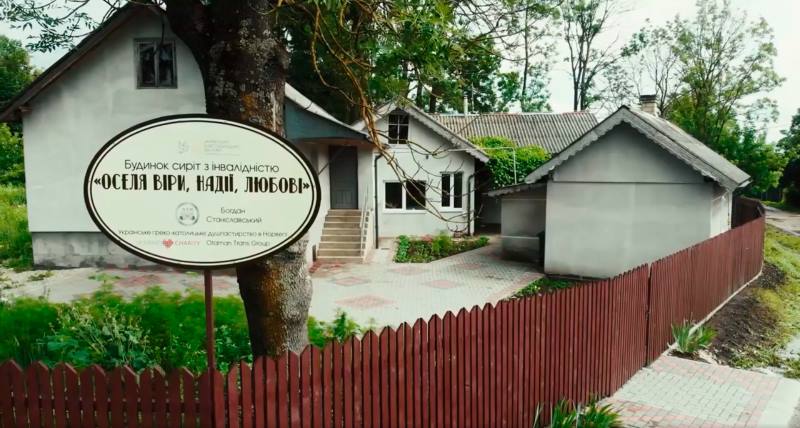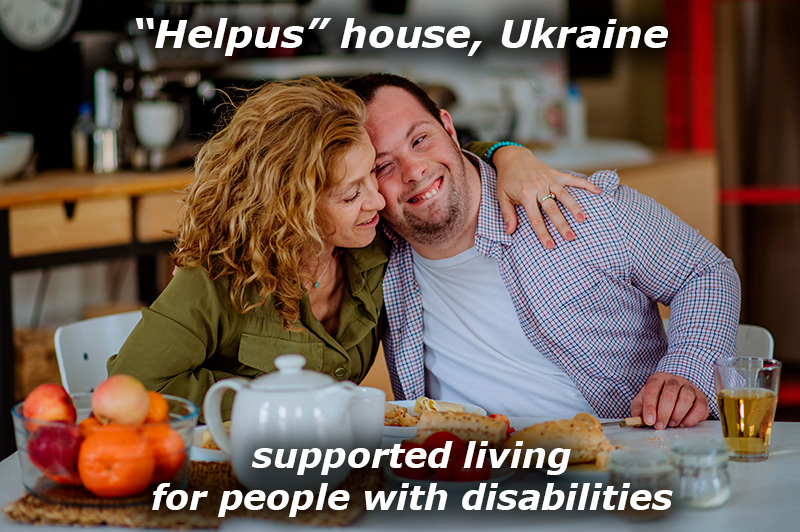
On October 21, the occupying authorities took 54 residents out of the Kherson psycho-neurological institution in the village of Komyshany. They were convinced that they were going to Crimea on vacation, and when the situation stabilized, they would be able to return. After that, the women got in touch only once, and neither the employees of the psycho-neurological institution nor their relatives know where they are now. And although before leaving, the russians convinced the women to write consent that they were doing it voluntarily, human rights defenders claim that this is still the abduction of people with disabilities and a war crime. In the future, it will be even more difficult to bring these women home than prisoners of war. "Babel" correspondent Hanna Mamonova spoke with employees of a psycho-neurological institution, with parents who are looking for their daughter in Crimea, and with human rights defenders. They tell what happened in Komysany and why the abduction of people from a psycho-neurological institution should be tried at the International Criminal Court (ICC) in The Hague.
1.
The women's psycho-neurological institution in Komyshany has been operating since Soviet times. Before the full-scale invasion, it housed 400 women, cared for by 200 workers. Everyone has different psychoneurological diseases, the state of health is also different. Nurses called those who could take care of themselves the "labor group." Women independently dressed, washed, brushed their teeth, cleaned their beds, and ate. Another group is "bedsiders" who needed constant help. Lyubov Stashko, the head nurse of the psycho-neurological institution, explains that not all of these women were immobilized due to mental illness - some had suffered a stroke, so they were aware of themselves, but did not get up.
Komysany was occupied on March 1. The head of the village, Kateryna Rogova, remembers how, a day before the occupation, she managed to take home a working computer and buried all the documentation in a field outside Komyshany. To those who were leaving, she tried to issue confirming certificates inconspicuously to the occupiers, and to those who remained, she sought humanitarian aid. The goods from the controlled territory in Komysany disappeared already in April, and the russian goods from the occupied Crimea have not yet been brought. Rogova received humanitarian aid from Zaporizhzhia, she was transported across the front line to Gola Prystan and sent to Kherson by ferry. If there were feesbeshniks waiting in the river port, then Rohova does not pick up the cargo until they leave.

One of the places where Rogova constantly transferred the humanitarian was a psycho-neurological institution for women. There they ran out of food and hygiene products, so they only had to rely on what volunteers brought: bread, vegetables, diapers for adults, urological pads, and first aid medicines.
In July, the director of the psycho-neurological institution, Borys Shutikov, gathered a team and said that he had decided to cooperate with the russian occupation authorities — with the former head Oleksandr Fateev, whom the russians appointed "village head" on May 30 instead of Rogova.
— The director was forced to do it [to cooperate with collaborators], I am convinced of that, — says nurse Stashko. — Shutikov told us that the wards need to be fed, treated, and cared for. One help of volunteers is not enough for us.
After the collective meeting and Shutikov's statement, the russian military began to bring food, necessary medicines and other things to the psycho-neurological institution. And on October 19, Shutikov summoned the head nurse to his office, introduced her to a woman he called a doctor from Kherson, and informed her that she was evacuating residents of the psycho-neurological institution to Crimea. He assured that only those who want to be evacuated will be evacuated.
"He told me to show the women to a doctor from Kherson, to hand over their medical histories and to compile a list of those willing to evacuate to Crimea," says Stashko. — The doctor interviewed people, 54 women agreed. They are all from the "independent" group - they can serve themselves. There were no bedridden among them.
The next day, two men came to the psycho-neurological institution, said that they were doctors from the Crimea and planned to take the women to the peninsula - to the Krasnogvardiy psycho-neurological institution in the village of Nekrasove. It is not known whether they were actually doctors, the men did not name themselves.
— The wards asked: "Are we going to Crimea on vacation?" Stashko recalls. - They answered that yes, they will rest there, that they don't shoot in Crimea and that the women will return [to Komysany] "if everything settles down."

All 54 women who agreed to leave, at the request of the "Crimean doctors", signed an agreement that they voluntarily accepted such a decision, a nurse at the psycho-neurological institution told "Babel", who asked not to be named. But Stashko says that she has not seen women sign any documents. Ukrainian passports were taken from the women and they were taken out of the psycho-neurological institution on October 21. In a couple of days, several of them called the nurses in Komysany — they said that nothing bad had happened to them on the way, and that they "give cookies and candies" in the new psycho-neurological institution.
After that, they did not contact each other. Then, on the right bank of the Kherson region, electricity and mobile communications disappeared - the russians, fleeing from Kherson, cut off the city's electricity and blew up the bridges across the Dnipro. Neither the nurses nor the Ukrainian law enforcement officers know where the women from the Komyshanskogo psycho-neurological institution are now. Based on this fact, proceedings were opened under the article "Violation of the Laws and Customs of War", Prosecutor of the Kherson Regional Prosecutor's Office Kostyantyn Podolyak told "Babel".
2.
Of the 54 women who left for the occupied peninsula, only seven had guardians: three were relatives, at four were the director of the psycho-neurological institution. The doctors could not contact their relatives because they had their Ukrainian numbers, and only the russian mobile phone worked. The director, who disappeared on the eve of the liberation of Kherson, gave permission for the others to be taken away.
One of such women, whose guardian was the director of the psycho-neurological institution, is 45-year-old Olga Okul. Now her parents, Natalia and Volodymyr Okula, are looking for her.
"Olechka has Down syndrome," Nataliya Okul tells. - Her guardian is the state, but before the war we visited her, took her for the weekend. After February 24, we could no longer come, but we spoke on the phone every week.
Olga's father adds that his daughter did not call the nurses in Komysany and did not inform them that she had arrived in Crimea.
- The fact that she is there is known only hypothetically, because someone called. But it wasn't our child who called, says Volodymyr. - Olya can call, she constantly called us from Komyshan. Why she didn't call in Komysany from Crimea is not clear.
The Okuli family does not know how to get their daughter back. They went to the Social Security Department of the Kherson Regional Council, and were told that the law enforcement officers were investigating. No one advised the parents to write a statement to the police or prosecutor's office.
Natalya wants to go to Crimea by herself along with Olga. I have already learned that there is a ferry from Kherson to the occupied left bank. But which means of transport to go to the peninsula is confusing.
— Even if I come to the psycho-neurological institution to my daughter, I have no documents that I am her guardian. The guardian is the state. That puts me off a bit.

3.
The women taken out of the Komyshanskogo psycho-neurological institution have become civilian hostages of the russian federation, human rights activist Serhiy Movchan tells Babel. And he adds that russia has committed at least two war crimes.
"It is possible that the russian army used the buses on which the women were taken to the peninsula as human shields when they were retreating," says the human rights activist. - We have no evidence that it did not happen. It is also a violent abduction of people. Seven women were recognized by the court as incompetent, but they were still sent to Crimea. The other women are capable, but there is a question of whether they were aware of the consequences of their decision.
If women are really in a psycho-neurological institutionin Crimea, it is the same as in a russian prison, adds Movchan. If they want to return to the Kherson region, they will not be able to do so without the permission of the administration of the Crimean psycho-neurological institution. It is even more difficult to return women home than Ukrainian soldiers from captivity, because they do not have the status of prisoners. Russia will insist that the women voluntarily entered the territory of the russian federation and are there of their own free will. According to Movchan, this is why the women were forced to sign consent to leave.
Another problem that the human rights defender sees: Ukrainian passports were taken away from women. Therefore, even if relatives come to pick them up, women without documents will simply not be released from Crimea. Movchan has already faced such cases - a person from a geriatric psycho-neurological institution in Mariupol was deported to the rostov region, where his Ukrainian passport was taken away. When the deportee's relatives came to return him to Ukraine, they were not given the documents.
— The family tried to get at least some certificate in russia that they are Ukrainians. They were refused, he says.
According to Movchan, the only effective option that exists to bring women home from the psycho-neurological institution in Komyshany is to contact the International Committee of the Red Cross.
— Although everyone complains that this organization is ineffective, its representatives can go to Crimea and at least check the conditions of people's detention. Next is to negotiate a release, Movchan explains.
But not everything is simple with this option either. ICRC spokesman Oleksandr Vlasenko explained in a comment to "Babel" that the organization operates according to a clear algorithm: relatives must first contact the Red Cross, and only after that can a dialogue with the russian authorities be started. If the women deported to Crimea do not have relatives or guardians, says Vlasenko, then the National Information Bureau, which was opened in Ukraine after February 24 to search for missing persons and release prisoners, can contact the ICRC. At their request, the International Committee of the Red Cross will begin a search.
4.
Why did the Ukrainian authorities not evacuate the psycho-neurological institution?
Due to the fact that at the beginning of the invasion, the russian army quickly advanced through Ukraine, at least 42 psycho-neurological institutions were in the occupation - a sixth of all such Ukrainian institutions. Psycho-neurological institutions are subordinated to the local administration of social protection of the population. In most cases, they did not deal with evacuation issues. Employees of such departments, with whom "Babel" communicated, explain that the russians quickly seized the territories and no one was ready for this. The psycho-neurological institutions did not even have evacuation plans because they did not receive them from the authorities.
Where the russians did not advance so quickly, for example, in the Kharkiv region, it was possible to evacuate people from the heavily shelled areas. Some psycho-neurological institutions, which were already under occupation, were also evacuated, but for this it was necessary to negotiate with the russian military. So, for example, 420 people were taken out of the Borodyansky psycho-neurological institution in the Kyiv region. Inna Ivanova, the head of the social protection department of the military-civilian administration of the Kherson region, in a conversation with "Babel" claims that it was impossible to agree with the russians on the evacuation of the psycho-neurological institutions, because "they created a picture of a happy life, which did not fit the fact that Ukraine is removing its people." .
The Komyshansky psycho-neurological institution is not the only one from which the russians took residents of the Kherson region to Crimea or deported them to russia in October and November. The Ukrainian authorities are aware of at least 300 deported people — both adults and children. None of them could be returned to Ukraine.
Export children and adults with disabilities from psycho-neurological institutions is russia's tactic in the war with Ukraine, human rights activist Viktoriya Kharchenko explains to Babel. It started back in 2014, when the russian military occupied Luhansk. In the summer of the first year of the war, they tried to take 69 children aged four months to four years from the regional orphanage to the Rostov region. The director of the orphanage, Kateryna Dontsova, was told that the children are being sent to Crimea together with the employees of the orphanage. Due to publicity, the bus with the children was turned around at the russian border.
How many people with disabilities russia has taken out of Ukraine is unknown, says Kharchenko. But such cases were not only in Kherson region, but also in Kharkiv region and Mariupol. Serhii Movchan believes that these episodes should be considered as a crime against humanity at the International Criminal Court in The Hague.
— Representatives of the International Criminal Court at the last meeting, which took place in early December, stated that they have three focuses: children, sexual crimes and shelling of infrastructure facilities, — he says. — But mass event of abduction of the most defenseless also have the prospect of consideration in the court in The Hague.

Crimean doctors, who took part in the abduction of women from the Komyshanskogo psycho-neurological institution, became complicit in a war crime, Movchan adds. If they have Ukrainian citizenship, they will most likely be tried in Ukraine. If not, then in the ISS together with the russians, who gave the order to take out the Ukrainian women.
He considers the possible argument of the russian side that this is not a forced removal, but an evacuation, unpromising. Since the International Criminal Court needs to prove that Ukraine fired at or destroyed the Komyshanskiy psycho-neurological institution. And this was not the case.
- Any appeals that they were saving them - nothing. What did you save them from? You put them in danger yourself. You kidnapped people with mental illness: where is the proof that they were aware of the consequences of their decision? - says Movchan.
He believes that russia abducts people from psycho-neurological institutions in order to create a propaganda picture - they say that the russian federation saves people with disabilities.
5.
When the russians retreated from the right bank of the Dnieper, they began shelling Kherson and its suburbs from the left bank. Flights arrive in Komysany almost every day. There are no victims, says Rogova, but many houses have been damaged. Mines are also laid next to the psycho-neurological institution.
"It is "priletu" three to four hundred meters from us," says Stashko. — The russians were afraid that the Armed Forces of Ukraine were shelling the psycho-neurological institution, and now they are shooting at it themselves. From the first days, February 24, we are on the front line.
After 54 women from the psycho-neurological institution were taken to Crimea, nurses took care of the remaining 350 wards. But by the end of December, the Kherson regional authorities evacuated everyone due to heavy shelling — the women were taken to Mykolaiv and Cherkasy. Kherson authorities offered the medical staff of the psycho-neurological institution to evacuate together with the women. But the vast majority of nurses refused. They say that they remain without work in the winter, but they do not dare to leave their homes move.
"Yesterday, a landmine flew into my neighbors' house," says Stashko. - And I live very close to work. The next one can be either at my house or at a psycho-neurological institution.



